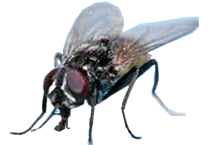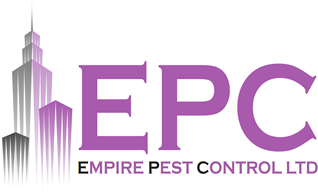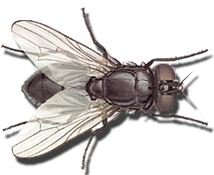
Common Housefly, Musca domestica
Key Features of the Fly
On average, flies will range from 6 to 8mm in length, with a wingspan of roughly 13 to 15mm. They are easily identifiable, with a greyish thorax and four stripes darker than the flies’ body. A maggot at birth, the fly will experience larval moults and slowly changes from white to cream in colour.
Biology
During their lifespan, a female can lay as many as 9,000 white eggs, if not more. Over a day, maggots will hatch and feed on decaying organic sources, like rubbish, for example. When maggots are ready to turn into pupae, they will seek out dry, cold shelter.
After adults emerge from the reddish-brown pupae, they will survive for up to two weeks and will not increase in size during adulthood. Around 36 hours after, female flies will be suitable for mating, but, typically, will only do so once. Males are known to be defensive over their territory as well.
The development of a fly is dependent on external factors, such as the amount of food they have access to, food quality, temperature and humidity levels. The below table is a guide to how long a fly spends at each life stage.
| Egg | 0.3 – 2 |
| Larva | 3.5 – 30+ |
| Pupa | 3 – 30+ |
| Adult | 30 – 90 |
Hygiene Management
Maintaining sanitation in a property is essential if you have any hopes of deterring fly infestations in the first place. This will help to restrict access to ideal breeding areas and concealing food waste will also go a long way in controlling an influx of flies. The management of flies begins at home.
As for farms, any manure needs to be stored dry in order to avoid providing moist conditions for flies to breed.
Fly Infestation Control
Houseflies pose the danger of transmitting harmful intestinal worm eggs and adults. They may also carry diseases including tuberculosis and typhoid cholera, which is why it is so important to invest in fly control services from established sources like Empire in London. With regular feeding routines, flies can easily contaminate foodstuffs, as they also consume food by liquefying it and regurgitating contents on the meal. After they have done so, they will suck up the liquid and may cause fly spotting.
Unfortunately, as well as frequent feeding, flies also reproduce swiftly, so cutting the lifecycle short is the best way to deal with an infestation. As mentioned, maintaining good hygiene practices is essential, and food should be safely stored away to avoid attracting unwanted pests.
Other proofing measures may include fly screens and UV lights. On top of this, traps combined with bait may also be effective in reducing down the spread of the common house fly.
If you live or work in London then Empire can help you to deal with fly infestations as they are based in London, see this page to contact them today for specialist advice and professional support throughout.



